研究影响英语词汇语义变化的因素
《影响情态动词Will和Would语义强度的关键因素分析》范文

《影响情态动词Will和Would语义强度的关键因素分析》篇一影响情态动词“Will”和“Would”语义强度的关键因素分析一、引言情态动词在语言中扮演着重要的角色,它们用来表达说话者的意愿、义务、可能性等。
在英语中,“Will”和“Would”是两个常用的情态动词,但它们的语义强度却有所不同。
本文旨在分析影响这两个情态动词语义强度的关键因素。
二、情态动词“Will”和“Would”的概述“Will”和“Would”都是表示未来行为的情态动词,但它们的用法和语义强度有所不同。
“Will”通常表示坚定的决心或预测,而“Would”则更多地表示一种可能性或倾向。
三、影响语义强度的关键因素1. 语境因素语境是影响情态动词语义强度的关键因素之一。
在不同的语境下,同一个情态动词的语义强度可能会有所不同。
例如,在正式的场合中,使用“Will”可能表达出更坚定的决心,而在非正式的场合中,使用“Would”可能更符合口语化的表达习惯。
2. 语调与重音语调与重音也是影响情态动词语义强度的因素。
在说话时,语调的高低、升降以及重音的放置都会影响情态动词的语义强度。
例如,当说话人强调“Will”时,可能会使其表达出更强烈的决心;而当说话人将重音放在“Would”上时,可能会使其表达出更多的可能性或倾向性。
3. 词汇搭配与组合词汇的搭配与组合也会影响情态动词的语义强度。
不同的词汇与“Will”或“Would”搭配,可能会产生不同的语义强度。
例如,与“have to”搭配时,“Will”可能表达出更强烈的义务感;而与“maybe”搭配时,“Would”则可能表达出更多的不确定性。
4. 文化与心理因素文化与心理因素也会对情态动词的语义强度产生影响。
不同的文化背景下,人们对“Will”和“Would”的接受度和理解可能存在差异。
此外,个体的心理状态也会影响其对情态动词的选择和使用,从而影响其语义强度。
四、分析与应用通过对“Will”和“Would”情态动词在不同因素影响下的语义强度进行分析,我们可以更好地理解和运用这两个词汇。
论词汇语义翻译理论
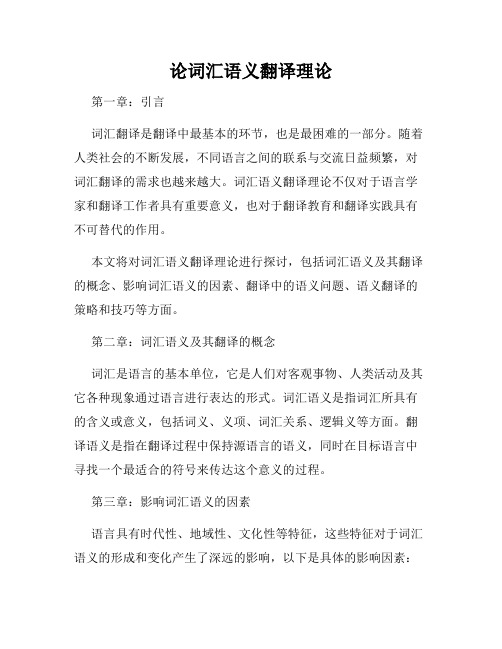
论词汇语义翻译理论第一章:引言词汇翻译是翻译中最基本的环节,也是最困难的一部分。
随着人类社会的不断发展,不同语言之间的联系与交流日益频繁,对词汇翻译的需求也越来越大。
词汇语义翻译理论不仅对于语言学家和翻译工作者具有重要意义,也对于翻译教育和翻译实践具有不可替代的作用。
本文将对词汇语义翻译理论进行探讨,包括词汇语义及其翻译的概念、影响词汇语义的因素、翻译中的语义问题、语义翻译的策略和技巧等方面。
第二章:词汇语义及其翻译的概念词汇是语言的基本单位,它是人们对客观事物、人类活动及其它各种现象通过语言进行表达的形式。
词汇语义是指词汇所具有的含义或意义,包括词义、义项、词汇关系、逻辑义等方面。
翻译语义是指在翻译过程中保持源语言的语义,同时在目标语言中寻找一个最适合的符号来传达这个意义的过程。
第三章:影响词汇语义的因素语言具有时代性、地域性、文化性等特征,这些特征对于词汇语义的形成和变化产生了深远的影响,以下是具体的影响因素:1. 时代背景因素:随着时代的变迁,社会和科技的不断进步,新事物、新技术、新词汇不断涌现,原先的词义会逐渐发生变化。
2. 地域和语言因素:不同的地域环境和语言环境下,同一词汇具有不同的词义,甚至是相反的词义。
3. 文化因素:不同的文化背景下,同一事物的意义存在很大的差异。
4. 个人因素:个体的认知、经验和情感因素对词义产生重要的影响。
第四章:翻译中的语义问题在语义翻译的过程中会遇到许多问题,例如:1. 原文与译文语义不匹配。
2. 目标语言中没有一个确切的符号与源语言的词义相对应。
3. 目标语言中有多个符号可供选择,但不确定哪一个符号更适合表达意思。
4. 目标语言中某些具有特定义项的单词在源语言中没有能够对应的单词。
第五章:语义翻译的策略和技巧为了更好地解决语义翻译中的问题,需要采取一系列的翻译策略和技巧,包括:1. 对于生词和专业词汇,需要进行逐一解释,使用相关的文化背景和领域知识进行翻译。
浅析英语词汇变化的社会因素

1 . 引 言
人 类 社 会 一 直 在 不 断 发 展 变 化 ,而 作 为 人 类 表 达 思 想 和 交 流思 想 的交 际 工 具 。 具有 社会 性 的 语 言 也在 不 断 发 展 变 化 。 洪堡特说过 , 语言变化永不停息 , 它永 远 处 于不 断 发 展 之 中 。 若 语 言停 止 变 化 。 就 意 味着 语 言成 为 僵 尸 , 语言不断变化是 自 然 不 可 避 免 的 。 语 言 变 化 是 指 随 着 历 史 的 发 展 语 言 产 生 的 变 化。 它是 随着 内在 的语 言 变 异 开始 的 , 常 常 以 语 言变 异 的存 在 为条 件 。 从某种意义上说 , 变 化 就 是 变 异 。语 言变 异 是 指 语 言 中发 音 、 语法 或 选 词 的差 异 , 语 言 变 异 可 导 致 语 言 变 化 。在 同 时期 、 同一 地 区 , 一 种 语 言 项 目可 能 具 有 不 同 的 变 体 , 这 种 语 言变 体 在 社 团 与 社 团 、 人群与人群 、 人与人 、 地 区 与地 区 、 风 格 与 风格 等 之 间 不 同 。语 言 变 化 也 可 以发 生 在 语 言 的 各 个 层 次— — 语 音 、 词汇 、 句 法 和语 义 上 , 也有 可 能发 生 在 拼 写 上 。 作 为语 言 中最 活 跃 的 部 分 ,词 汇 的变 化 最 能 变 现 语 言 变 化 发 展 的趋 势 。 引起 英 语 词 汇 发 生 变 化 的 因 素很 多 , 但 主要 归 结 为 内 因 和外 因 。 内因 是 语 言 方 面 的 因 素 , 比如 语音 的 同 化异 化 、 词 的 混合 、 缩写、 隐喻 、 类 比, 等等 。 外 因是 社 会 因 素 , 这 是 社 会 语 言 学 家所 关 注 的一 个 重 要 方 面 。下 面 将 从 五 个 方 面 阐述 英 语
浅析英语词汇意义演变的原因和类型
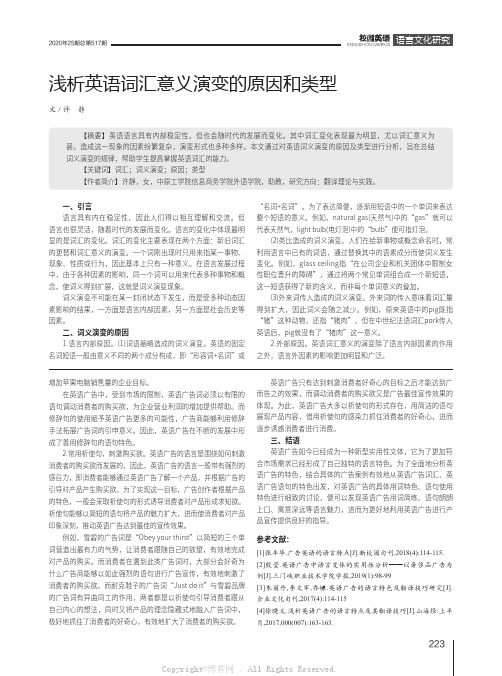
2232020年25期总第517期ENGLISH ON CAMPUS浅析英语词汇意义演变的原因和类型文/许 静【摘要】英语语言具有内部稳定性,但也会随时代的发展而变化。
其中词汇变化表现最为明显,尤以词汇意义为甚。
造成这一现象的因素纷繁复杂,演变形式也多种多样。
本文通过对英语词义演变的原因及类型进行分析,旨在总结词义演变的规律,帮助学生提高掌握英语词汇的能力。
【关键词】词汇;词义演变;原因;类型【作者简介】许静,女,中原工学院信息商务学院外语学院,助教,研究方向:翻译理论与实践。
“名词+名词”。
为了表达简便,逐渐用短语中的一个单词来表达整个短语的意义。
例如,natural gas(天然气)中的“gas”就可以代表天然气,light bulb(电灯泡)中的“bulb”便可指灯泡。
(2)类比造成的词义演变。
人们在给新事物或概念命名时,常利用语言中已有的词语,通过替换其中的语素成分而使词义发生变化。
例如,glass ceiling指“在公司企业和机关团体中限制女性职位晋升的障碍”,通过将两个常见单词组合成一个新短语,这一短语获得了新的含义,而非每个单词意义的叠加。
(3)外来词传入造成的词义演变。
外来词的传入意味着词汇量得到扩大,因此词义会随之减少。
例如,原来英语中的pig既指“猪”这种动物,还指“猪肉”,但在中世纪法语词汇pork传入英语后,pig就没有了“猪肉”这一意义。
2.外部原因。
英语词汇意义的演变除了语言内部因素的作用之外,语言外因素的影响更加明显和广泛。
一、引言语言具有内在稳定性,因此人们得以相互理解和交流。
但语言也很灵活,随着时代的发展而变化。
语言的变化中体现最明显的是词汇的变化。
词汇的变化主要表现在两个方面:新旧词汇的更替和词汇意义的演变。
一个词刚出现时只用来指某一事物、现象、性质或行为,因此基本上只有一种意义。
在语言发展过程中,由于各种因素的影响,同一个词可以用来代表多种事物和概念,使词义得到扩展,这就是词义演变现象。
词汇辨别的概念和影响因素

词汇辨别的概念和影响因素词汇辨别是指一个人在进行文字交流时获得准确地语言表达的能力,即一个人所具有的使自己和别人能通过语言清楚明白地了解意思的能力。
一、概念词汇辨别是根据词义和词义间的联系来分析词的意义和作用。
英语中词与词之间都有着紧密的联系,它们既可以互相替换,又可以相互补充,这种特点称为同义关系。
在表示同一概念时,不同的词有着不同的语义侧重点。
有些词义轻而具体,有些词义重而抽象,后者往往用前者来代表。
因此,词汇辨别也就是根据词义及其同义关系,把词放在具体语境中去判断和理解的能力。
二、影响因素词汇辨别能力高低主要表现为以下几个方面:(1)词义的理解准确率高,即词义的重要程度高; (2)对词语搭配的理解正确率高,即词语搭配的广泛性强; (3)对词语的组合结构和语法功能的把握准确率高,即具备较强的灵活运用语言的能力;(4)对上下文的词义理解准确率高,即上下文中的某个词与该词的意义相符,否则其他词将不会出现。
三、词汇辨别的方法(1)词义的理解准确率高,即词义的重要程度高。
在进行词义辨别时,首先必须认真仔细阅读原文,掌握全文大意,再考虑每个单词在句子中所起的作用,尤其是从全局考虑单词所表示的意思。
此外,还应注意到常用词义中的区别,如名词的普通形式、过去分词、短语、形容词或副词的比较级和最高级、动词的第三人称单数等。
(2)对词语搭配的理解正确率高,即词语搭配的广泛性强。
英语词汇中大多数单词在一定情况下都有固定的搭配习惯。
例如,在疑问句和祈使句中动词和介词要配合使用,动词要接名词或代词,形容词、副词、介词短语、连词要跟从属连词和并列连词配合使用,形容词和介词短语要接介词或副词等。
因此,在词汇辨别过程中,学生除了看懂全文外,还必须弄清楚每个单词在句子中的意思,看看它在上下文中的位置,搞清搭配关系,只有这样才能做到词不离句。
(3)对词语的组合结构和语法功能的把握准确率高,即具备较强的灵活运用语言的能力。
在词汇辨别时,要结合上下文仔细推敲词的词义和词性。
英汉词语文化语义对比研究

英汉词语文化语义对比研究语言是文化的载体,而词汇是语言的基础。
因此,研究英汉两种语言的词汇文化语义对比对于理解中西方文化、提高跨文化交流能力具有重要意义。
本文将从文化语义定义、研究现状、产生原因、表现形式及未来展望等方面进行探讨。
文化语义是指词语在特定文化背景下的含义和内涵,这种含义往往与字面意义不同。
在英汉两种语言中,文化语义具有显著差异,这种差异受到历史、地域、宗教、风俗习惯等多种因素的影响。
近年来,随着语言学和文化学的发展,越来越多的学者开始英汉词语文化语义对比研究。
现有研究主要集中在文化语义差异的成因、表现形式及翻译策略等方面。
英汉词语文化语义差异的产生主要受到以下因素的影响:历史背景:英汉两种语言的历史背景截然不同,这种历史沉淀导致了许多词汇具有特定的文化内涵。
文化传统:中西方文化传统差异巨大,这种传统影响了人们对于某些词汇的理解和认知。
宗教信仰:不同的宗教信仰对词汇的文化语义产生了重要影响,如英语中的“God”和汉语中的“佛”、“道”等。
英汉词语文化语义差异的表现形式多种多样,以下是几种主要形式:形象意义不同:某些词汇在两种语言中的形象意义存在明显差异,例如“龙”在英语中往往被翻译成“dragon”,而在汉语中则是吉祥、高贵的象征。
情感色彩不同:在两种语言中,某些词汇的情感色彩可能存在差异,例如“dog”在英语中往往被视为忠诚和勇敢的象征,而在汉语中则往往带有贬义。
比喻意义不同:在两种语言中,某些词汇的比喻意义可能存在显著差异,例如“风”在英语中往往被用来比喻爱情和自由,而在汉语中则更多地被用来比喻灾难和困境。
随着全球化的不断深入和跨文化交流的日益频繁,英汉词语文化语义对比研究将越来越受到重视。
未来研究可以从以下几个方面展开:系统性研究:系统地梳理英汉两种语言的文化语义差异,从历史、文化、宗教等多个角度进行分析和比较。
跨学科研究:借鉴其他学科的理论和方法,如认知科学、社会学等,对英汉词语文化语义进行多维度研究。
英语翻译中的语义失真分析

英语翻译中的语义失真分析在当今全球化的时代,英语作为一门国际通用语言,其翻译的重要性日益凸显。
然而,在翻译过程中,语义失真的问题却时常出现,给交流和理解带来了诸多困扰。
语义失真是指在翻译过程中,源语言的语义在目标语言中没有得到准确、完整或恰当的传达,导致信息的偏差或误解。
本文将对英语翻译中语义失真的原因进行分析,并探讨相应的解决策略。
一、词汇层面的语义失真词汇是语言的基本单位,在翻译中,词汇的选择不当往往是导致语义失真的重要原因之一。
1、一词多义英语中许多单词具有多种含义,在不同的语境中需要选择合适的释义。
例如,“bank”这个单词,既可以表示“银行”,也可以表示“河岸”。
如果不根据具体语境进行准确判断,就容易造成语义误解。
2、词汇搭配不同语言在词汇搭配上存在差异。
某些在英语中常见的搭配,在汉语中可能并不适用。
比如,“heavy rain”翻译成“大雨”是正确的,但如果翻译成“沉重的雨”就显得不伦不类,这就是词汇搭配不当导致的语义失真。
3、文化内涵词一些词汇承载着特定的文化内涵,在翻译时如果不能充分理解其文化背景,就无法准确传达其含义。
比如,“dragon”在西方文化中通常被视为邪恶的象征,而在中国文化中则代表着吉祥和权威。
如果直接将“亚洲四小龙”翻译成“Four Asian Dragons”,可能会引起西方读者的误解。
二、语法层面的语义失真语法结构的差异也是导致英语翻译语义失真的一个重要因素。
1、语序差异英语和汉语的语序在很多情况下并不相同。
例如,英语中的定语从句通常位于先行词之后,而汉语中则习惯将定语放在先行词之前。
如果在翻译时不注意语序的调整,就可能导致语义混乱。
2、时态和语态英语中的时态和语态丰富多样,而汉语中则相对较少通过语法形式来表达时态和语态。
在翻译时,如果不能准确把握英语的时态和语态,并在汉语中进行恰当的转换,就容易出现语义偏差。
3、句子结构英语句子结构较为复杂,常常使用从句、短语等进行修饰和补充。
词义演变的原因

(一)词义是和词的语音形式结合在一起的人们对现实现象的反映,现实现象的变化自然会引起词义的变化。
(二)人们主观认识的发展也会引向词义变化。
(三)词的意义之间是相互联系的。
一个词的意义的变化也可以引起和它有联系的词的意义的变化。
(四)词义大多是在语义组合中获得自己明确的意义的。
组合关系的变化也会引起词义的改变。
(五)在某一个意义的基础上通过引申的途径产生新的意义,这是词义发展中的一项重要内容。
(六)声调的改变巩固了词义引申的结果,标志着一个词由于词义的引申衍生而正式分化成几个词。
(七)多义词是在原有意义的基础上通过隐喻、换喻等方式引申出新的意义,这属于意义的增加和分化的范畴。
在词义的发展中也有相反的现象,一些复合词或固定词组,其中一个语素的意义可以吞并其他语速的意义而成为整个语言单位的意义。
英语词汇的主要语义理据及其成因研究

英语词汇的主要语义理据及其成因研究
杨 红 燕
( 中国地质大学 外 国语学院,湖北 武汉 407 ) 3 04
[ 内容 提要] 本文对隐喻 、提喻、借代 、类 比、通感等英语词汇 中的主要语义理据进行 了分析,并对形成语 义理据 的语境 、社会文化、心理等 因素进行 了简要探讨 ,以达到帮助英语学习者更好地理解和记 忆英语词汇 的 目
1 )Th oya dp a t es o l lwa sg a di a d. e r n rci ቤተ መጻሕፍቲ ባይዱh uda y ob n nh c n
、
引 言
“ 理据 ( t a o )一词 最早 由S usr提 出。 15 ) moi t n ” vi asue 他(9 9 在解释语 言符 号的任意 性 (riay abt r )时用到 了“ r 无理据 的 (n t a d 一词 [。与语言符号的任 意性相对 的则是语 u moi t )” ve 1 ]
言符号 的象似性 , 体现 为语 言符号 与所指客体象似 , 客体 是 的复制 ,或者是客体的标志和象征,例如英语 中用 me w来 o
模拟猫 的叫声 。 此外还体现 为新 的语言符 号与原有 的语言符 号象似 ,例如,英语 中的“o k 和“tr” b o ” s e虽然 与所指 的客体 o 之 间没 有 必 然 的联 系 ,但 “o ktr” “o k 和“tr” 间 b o s e 与 b o ” s e之 o o 有直观 的联系 。 这些体现象似性的联系就是理据 。 国语言 德 学家 U l n (9 2 l n 16 )对理据进 行了较 为详尽 的叙述 。他列 ma 举 了三种主要的理据 :1 )语音理据 (h n t t a o ) poec i tn ; i mo v i 2 )词法 ( 或形态 )理据 ( rh lgcl t ao ) )语 mop oo i i t n ;3 a mo v i 义理据 (e n cmo v t n 2 smat t a o )[。另外还存在其他类 型的理 i i i 】 据 ,如词源理据 、逻辑理据 、形态理据等 。 在 不同类型 的词汇理据 中, 语义 理据所要解释 的是词 的 本义和新意义之 间的联系 , 从而 为理解词汇意义 的变化提供 根据 。 随着语言 的发展 , 词汇 的意义总是不断延伸和变化的 ,
英语中的新词语义演变趋势
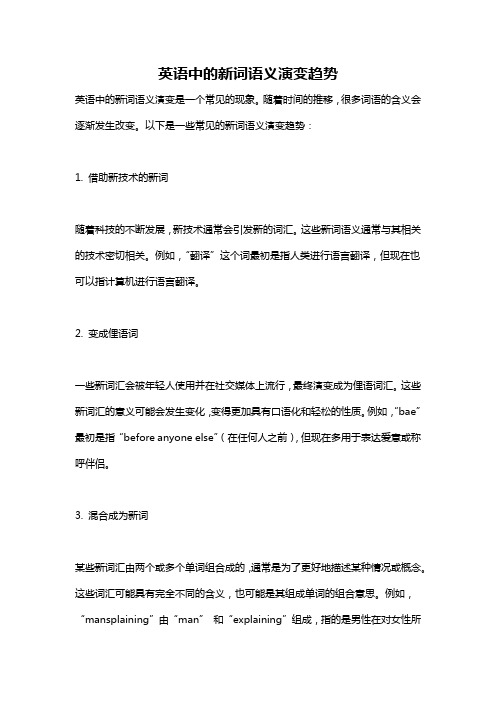
英语中的新词语义演变趋势
英语中的新词语义演变是一个常见的现象。
随着时间的推移,很多词语的含义会逐渐发生改变。
以下是一些常见的新词语义演变趋势:
1. 借助新技术的新词
随着科技的不断发展,新技术通常会引发新的词汇。
这些新词语义通常与其相关的技术密切相关。
例如,“翻译”这个词最初是指人类进行语言翻译,但现在也可以指计算机进行语言翻译。
2. 变成俚语词
一些新词汇会被年轻人使用并在社交媒体上流行,最终演变成为俚语词汇。
这些新词汇的意义可能会发生变化,变得更加具有口语化和轻松的性质。
例如,“bae”最初是指“before anyone else”(在任何人之前),但现在多用于表达爱意或称呼伴侣。
3. 混合成为新词
某些新词汇由两个或多个单词组合成的,通常是为了更好地描述某种情况或概念。
这些词汇可能具有完全不同的含义,也可能是其组成单词的组合意思。
例如,“mansplaining”由“man”和“explaining”组成,指的是男性在对女性所
知更少的领域进行自以为是的解释。
总的来说,英语中的新词语义演变是由多种因素共同作用的结果。
它们可能源于科技的发展、社会文化的变化,或是一种新潮文化的出现。
浅谈英语语境对语义的影响
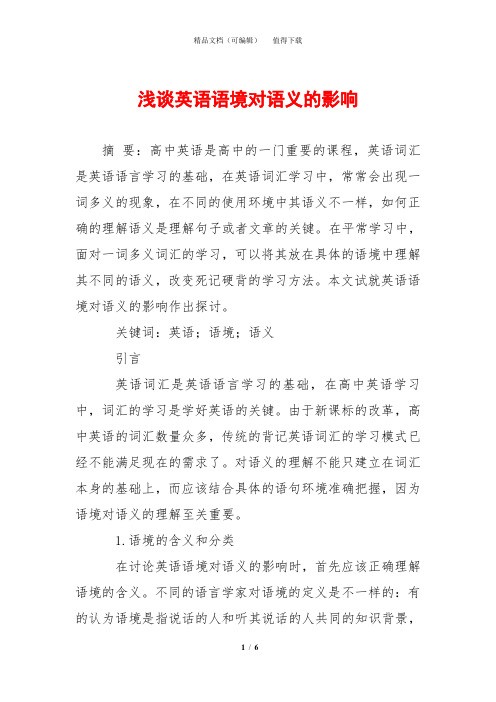
浅谈英语语境对语义的影响摘要:高中英语是高中的一门重要的课程,英语词汇是英语语言学习的基础,在英语词汇学习中,常常会出现一词多义的现象,在不同的使用环境中其语义不一样,如何正确的理解语义是理解句子或者文章的关键。
在平常学习中,面对一词多义词汇的学习,可以将其放在具体的语境中理解其不同的语义,改变死记硬背的学习方法。
本文试就英语语境对语义的影响作出探讨。
关键词:英语;语境;语义引言英语词汇是英语语言学习的基础,在高中英语学习中,词汇的学习是学好英语的关键。
由于新课标的改革,高中英语的词汇数量众多,传统的背记英语词汇的学习模式已经不能满足现在的需求了。
对语义的理解不能只建立在词汇本身的基础上,而应该结合具体的语句环境准确把握,因为语境对语义的理解至关重要。
1.语境的含义和分类在讨论英语语境对语义的影响时,首先应该正确理解语境的含义。
不同的语言学家对语境的定义是不一样的:有的认为语境是指说话的人和听其说话的人共同的知识背景,有的认为语境是指一个人为了正确的表达话语,在与别人交流过程中具备的一定的知识。
在英语学习过程中,英语语境就是指可以帮助别人正确理解目标语言的相关知识。
狭义的英语语境是指在一个句子或者段落中,目标语言以及前后的词语在这个句子中或者在整个句子及其上下文中的语境。
语境可以分为语言语境和非语言语境,语言语境就是指目标词语的语音、语法和用法相关的知识。
和语言语境相比,非语言语境包括的范围非常广,除了语言语境之外,还包括说话人的性别、年龄、社会地位等一切背景、说话发生的时间、地点以及说话人的肢体语言、面部表情等[1]。
2.新课标理念下英语词汇学习的特点2.1英语词汇数量多由于新课标改革的不断深入,对高中英语词汇的学习提出了更高的要求,最直接的就是要求对英语词汇量的学习掌握要更多,同时对于很多词汇的涵义要掌握得更深,要能够熟练地运用词汇,而不仅仅是单纯的记忆和理解了。
2.2对词汇要有更深的理解由于要求对词汇学习的深度增加,所以对英语词汇的学习应该做到与句子和语境相结合。
浅析英语词汇意义的变化特征

特 殊化 。
一
、
由于时代 的发展 , 人的认识的不断深入与发生变化 , 词从古代发展 到现在 , 词义多少会发生相应的变化 。 一位早期的语 义学家把词义变化 的原因归纳为三十一条 , 可见词义变化的复杂性。 尽管词义变化的原因 很多 , 主要 的有 : 但 1 . 历史因素 。英语 的历 史起源 于公元 五世纪上半叶撒 克逊 和裘德 人所使用的语 言, 后来经历了漫长的社会发展和变化 , 特别是英 国历史 上两次外来人侵者 的统治加剧了词 义的变化 。 2 . 因素 。社会是在不断发展 中进步的 , 社会 语言是社会发展变化 的 晴雨表。 伴随事物 、 、 现象 行为变化 以及社会 的发展和科学 的进步 , 会给 词赋予新的含义 , 词义也必然有所变化 。 3 言因素 。词义的变化常常是 由于语言的发展而造成 的, . 语 语言 的 发展总是朝着一定的规律而动的 , 如词的省略 , 使得原本需要几个词表 达的含义转 到一个词上 , 使词义发生 了变化 。
科技信息 ຫໍສະໝຸດ 人 文社科 浅析 英 语i [ 义的 变 化特 征 ll 意
广西 师范 大学外 国语 学院 唐 芳 洲
[ 摘 要] 词义是词的 内 , 容 是对客观事物现 象的反 映, 包含着人们对客观事物各种特点的认识。 随着时代 的变迁, 英语像其它语言一
样处于不断地发展 变化 中 , 义的 变化是其 中重要 的方面。 些新词 出现 了, 词 一 一些旧词 消失 了, 一些词的词 义正在发生 变化。英语 词 义是 随着社会的 变化而变化的 。本文主要从词义的扩展 , 义的缩小 , 词 词义的升格和词义的降格四个方面来探讨词 义变化的特征 。 [ 关键 词 ] 义 词 义 的 扩展 词 义 的 缩 小 词 义 的升 格 词 义 的 降 格 词
语义差异的的影响因素

语义差异的的影响因素
语义差异的影响因素可以包括以下几个方面:
1. 语言背景:不同的语言系统和文化背景会影响人们对词汇和语义的理解。
不同语言之间可能存在着词汇的差异,以及词汇之间的关联和联想方式的不同。
2. 语义领域:不同的学科领域和专业领域具有特定的术语和概念,这些专业术语和概念可能对于非专业人士来说具有不同的理解。
3. 语言使用者的知识和经验:一个人的知识和经验可以影响他对词汇和语义的理解。
人们根据自己的知识和经验来理解和解释语言中的词汇和概念。
4. 语言表达形式:语言表达形式对于传达语义非常重要。
一句话的语法结构、词汇选择、语调和语气等因素都可以影响人们对其语义的理解和理解方式。
5. 句子和上下文的语境:语义是有上下文依赖性的,同一个词汇在不同的句子和语境中可能具有不同的意义。
所以语义的理解需要考虑到句子和上下文的语境。
6. 个体差异:每个人的语义理解能力和经验背景都是不同的,因此对于语义的理解也会有个体差异。
综上所述,语义差异的影响因素包括语言背景、语义领域、语言使用者的知识和
经验、语言表达形式、句子和上下文的语境以及个体差异等多个方面。
浅析英语词汇意义变化的方式和原因

浅析英语词汇意义变化的方式和原因唐梅2012级英语(一)班21号摘要:语言作为人类主要的交流方式,承载了大量的文化信息。
而哲学认为世间万物都是处于不断运动和变化之中的,因此语言也是变化的。
而词汇又是语言中最活跃最不稳定的部分,也是一直处于变化发展中的。
(张维友,华先发,1988(6):124-131)但词义变化的原因和方式也是各种各样的。
因此笔者希望通过对词汇意义变化的方式及原因的归纳及分析,帮助读者更好的掌握词汇的准确含义。
关键词:英语词义变化;方式;原因一、英语词汇意义变化的七种方式(一)词义扩大词义扩展也叫做泛化,也就是说一个词语由原来的特殊意义扩大而成为了一种泛指意义。
如companion过去专指分享面包的人,但现在却指伙伴,同伴。
又如street,以前指用石头铺成的路,但今天主要指街道或马路。
再如lady一词,它以前仅仅指“女主人”。
到了今天,lady可以适用于任何女人,成为了一种礼貌的用法,或许以后还会经历变化。
(二)、词义的缩小词义的缩小,也叫做特殊化,就是一个拥有广泛意思的单词转为了专业的特指的词汇。
例如,“妻子”现在由wife表示,但在过去wife却泛指“女人”。
又如barbarian原本模糊的指“任何外国人”,后来专指“野蛮人”。
(三)、词义转移所有的语义变化都涉及词义的转移,这里的词义转移(meaning shift)从狭义来解释,究其原因是由于其原意由于隐喻用法而离开了原来的语义领域。
(胡壮麟,2007:76)它又可以细分为联想转移,有主观意义和客观意义的转移,抽象意义与具体意义之间的转移以及通感(杨春慧,张璇,2010:186)。
例如,pitiful 原意是:“充满同情心的”,现在为“值得可怜的”。
这个词就由主观意义转变为了客观意义。
而联想转移主要是用人体器官的比喻意义去描述语言。
如:the tongue of fire(火舌),the eye of a target(靶心),the teeth of a saw(锯齿)等。
词汇语义学的相关研究

词汇语义学的相关研究词汇语义学是语言学的一个分支,主要研究词汇的意义及其语境中的使用。
它关注单词之间的关系,探究它们的意义、语用信息以及语言结构之间的关系。
词汇分为两种类型:原型词汇和引申(派生)词汇。
原型词汇即常规用法的中心词汇,而引申词汇是通过原型词汇来形成的新词汇。
本文将详细探讨词汇语义学的相关研究内容。
语义分析语义分析是词汇语义学研究的一个主要方向。
它是指通过语言学方法系统地研究单词之间的差异及其相关度量,以及它们在不同语言语境中的含义和使用。
一般来说,语义分析包括两个关键任务:(1)在理论上,为每个单词确定唯一的语义,将其与相关词汇联系起来,并尝试理解不同语境下使用的方式;(2)在实际上,将理论研究应用于文本分析、翻译和其他自然语言处理中。
语义分析还可以分为不同的类型,例如:• 词汇分析,就是将单词分类,比如把所有动词放在一起;• 意群分析,是将单词按意义组织成群,比如不同的“动物”、“运动”、“感情”等。
由于单词的含义是动态和多层次的,要了解语义分析的本质,就需要考虑一些复杂性问题,比如:• 同义词和反义词有着相互的联系,而这些联系是模糊的;• 词汇和词义的概念是交叉的,因此单个词汇可以有多个不同的词义。
语用语义学语用语义学是一种实用化的外语教学、翻译学和交际学分支,它着重于探讨在语言使用中,单词、语言习惯和语言习惯之间的关系。
语用语义学的研究对象包括语言因素和非语言因素。
语用语义学的主要目的是了解当地语言文化和通信方式,从而帮助外语学习者更好地理解语言习惯和文化背景。
通过语用语义学的研究,学生不仅可以学习自然习惯用语,还可以了解不同社交语境的语言风格。
此外,语用语义学也有助于提高外语交际能力,增强听说能力。
数据驱动的语义学研究数据驱动的语义学研究,通常基于计算机技术和相关的数据分析工具来实现语言分析。
由于这些工具可以处理大量的文本信息,因此数据驱动的方法在语言模型、情感度量、机器翻译等方向都有很好的应用前景。
语义演变认知动因探析

目的是词 汇 的变化 ,这 是 因为在人 类社 会 的发展
释新 , 现 对新 事 物 的认 知 、 释 和表 述 , 且 由 实 解 并
进 程 中 , 们不 断地 探究 到新 的东 西 , 成新 的观 此体现 出一定 的次 序性 、 律性 和系统性 。为 了表 人 形 规
人们 认 知 的对象 , 的特征 是 多层 次 、多侧 面 的 。 它
隐喻 概念 可 能 由本体 与 喻体 的某 一个 或 某几 个 特
传 统 的词 学 中隐喻 和转 喻 被认 为 语义 转移 的两 征构 成 , [ 一旦 这个 隐喻概 念形 成 , 喻体 的其他 潜 在
种 方 式 ,而 认 知 语言 学家 则认 为 两 者是 语义 演 变 特 征就 可能 随着人 们 认识 的 深化 而得 以显 现 。如 背 后 的认知 机制 。
收稿 日期 : 0 0 1— 5 2 1— 0 1 作 者 简 介 :张 秀萍 ( 95 )女 , 苏 徐 州人 , 教授 , 16 ~ , 江 副 主要 研 究方 向为英 语 语 言学 。
第 1 期
张 秀 萍 : 义 演 变 认 知 动 因探 析 语
1 3
“ 心之 官则 思 ” 这从 汉字 的造 字 中也 可 以看 出 , , 以
“ ” 意符 的“ 、 、 、 、 、 、 …… ” 多 心 为 想 思 念 忖 忆 愁 虑 好 是 与思 维 活动 有 关 的 。现在 虽然 认 识 到思 维 的器 官是 大脑 , 还是 保存 着 “ 我心里 想 ” 这样 的说法 。在
域 (re d ma ) t gt o i 之上 , a n 让我 们通 过始 源域 的结 构来 构建 和 理解 目标 域 。一个 隐喻概 念 中的喻 体作 为
英语阅读中语义误解的因素及解决对策
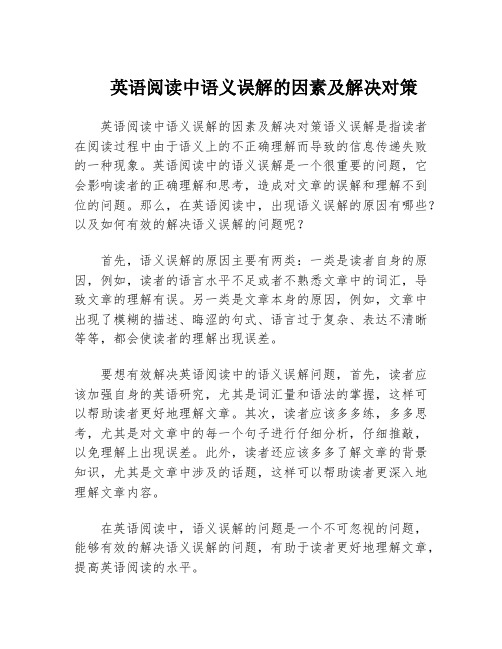
英语阅读中语义误解的因素及解决对策
英语阅读中语义误解的因素及解决对策语义误解是指读者在阅读过程中由于语义上的不正确理解而导致的信息传递失败的一种现象。
英语阅读中的语义误解是一个很重要的问题,它会影响读者的正确理解和思考,造成对文章的误解和理解不到位的问题。
那么,在英语阅读中,出现语义误解的原因有哪些?以及如何有效的解决语义误解的问题呢?
首先,语义误解的原因主要有两类:一类是读者自身的原因,例如,读者的语言水平不足或者不熟悉文章中的词汇,导致文章的理解有误。
另一类是文章本身的原因,例如,文章中出现了模糊的描述、晦涩的句式、语言过于复杂、表达不清晰等等,都会使读者的理解出现误差。
要想有效解决英语阅读中的语义误解问题,首先,读者应该加强自身的英语研究,尤其是词汇量和语法的掌握,这样可以帮助读者更好地理解文章。
其次,读者应该多多练,多多思考,尤其是对文章中的每一个句子进行仔细分析,仔细推敲,以免理解上出现误差。
此外,读者还应该多多了解文章的背景知识,尤其是文章中涉及的话题,这样可以帮助读者更深入地理解文章内容。
在英语阅读中,语义误解的问题是一个不可忽视的问题,能够有效的解决语义误解的问题,有助于读者更好地理解文章,提高英语阅读的水平。
英汉词汇形式语义及隐性语义的影响因素探析
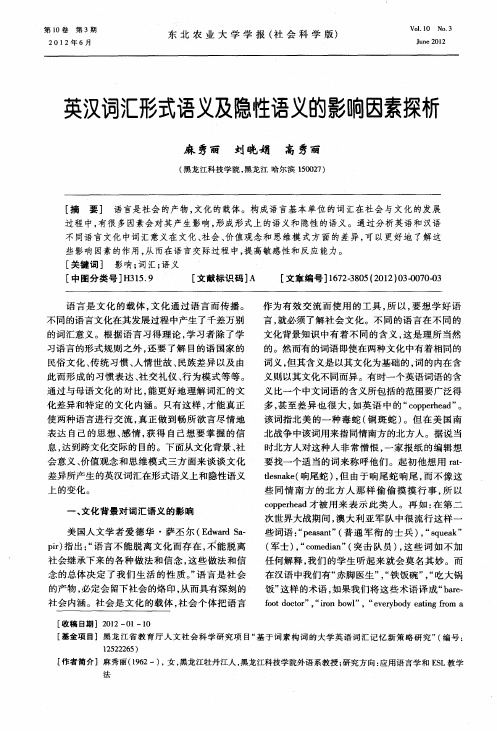
词义 , 但其含义是 以其文化为基础 的, 词的内在含
义则 以其 文化不 同而 异 。有 时一 个英 语词语 的含 义 比一个 中文词 语 的含义 所包 括 的范 围要 广 泛得 多 , 至 差 异 也 很 大 , 英 语 中 的 “ o pred 。 甚 如 cp eh a ” 该词 指北 美 的一 种 毒 蛇 ( 斑 蛇 ) 铜 。但 在 美 国南
cp eha o pred才 被 用来 表 示 此 类 人 。再 如 : 第 二 在
、
文 化背 景对词 汇语 义 的影响
次世界 大 战期 间 , 大利 亚 军 队 中很 流 行 这 样 一 澳
些词 语 :p aat 普 通 军 衔 的 士 兵 ) “ q e k “ esn”( , su a ” ( 士 ) “ o da ” 突 击 队 员 ) 这 些 词 如 不 加 军 , cme i ( n ,
第1卷 第 0 期
201 2年 6月
东 北 农 业 大 学 学 报 ( 会 科 学 版) 社
V0 . O No 3 11 .
J n 01 u e2 2
英汉词汇形式语义及隐性语义的影响因素探析
麻 秀丽 刘 晓娟 高 秀丽
( 黑龙 江 科 技 学 院 , 龙 江 哈 尔滨 102 ) 黑 50 7
会意 义 、 价值 观念 和 思 维模 式 三 方 面来 谈 谈 文 化 差 异所产 生 的英汉 词汇 在形 式语义 上 和隐性 语义
匕 的变化 。
一
要 找一个 适 当 的词来 称 呼他 们 。起 初 他 想 用 rt a . t sae 响尾 蛇 ) 但 由于 响尾 蛇 响尾 , 不 像 这 l nk ( e , 而 些 同 情 南 方 的 北 方 人 那 样 偷 偷 摸 摸 行 事 , 以 所
《2024年影响情态动词Will和Would语义强度的关键因素分析》范文

《影响情态动词Will和Would语义强度的关键因素分析》篇一影响情态动词“Will”和“Would”语义强度的关键因素分析一、引言情态动词在语言中扮演着重要的角色,它们能够表达说话者的意愿、决心、可能性等主观情感和态度。
在英语中,“Will”和“Would”是常用的情态动词,其语义强度因语境、语调、时态等不同因素而有所差异。
本文将针对这些因素进行详细分析,以探讨影响“Will”和“Would”语义强度的关键因素。
二、语义强度的基本概念情态动词的语义强度主要指其在表达说话者意愿、决心或可能性等情感和态度时的强度。
不同情境下,“Will”和“Would”的语义强度会发生变化,这种变化取决于多种因素。
三、影响“Will”和“Would”语义强度的关键因素1. 语境因素语境是影响情态动词语义强度的关键因素之一。
在不同的语境下,同一情态动词的语义强度可能有所不同。
例如,在正式场合下,使用“Will”表达决心或承诺时,其语义强度较强;而在非正式场合下,使用“Would”则可能显得更加随和。
2. 语调因素语调也是影响“Will”和“Would”语义强度的重要因素。
在同一语句中,通过改变语调的升降、强弱等,可以改变情态动词的语义强度。
例如,当强调某个动作或决策的决心时,使用升调的“Will”可以增强其语义强度。
3. 时态因素时态因素同样影响“Will”和“Would”的语义强度。
一般而言,现在时态的“Will”强调未来的计划或决定,其语义强度相对较强;而过去时态的“Would”则更多地表达过去的习惯或可能性,其语义强度相对较弱。
4. 搭配词语因素搭配词语也会影响“Will”和“Would”的语义强度。
例如,与“always”、“never”等词搭配时,可以增强其表达意愿或决心的强度;而与“maybe”、“perhaps”等词搭配时,则可能削弱其语义强度。
四、案例分析以一段对话为例:“I will finish the project on time.(我会按时完成项目。
- 1、下载文档前请自行甄别文档内容的完整性,平台不提供额外的编辑、内容补充、找答案等附加服务。
- 2、"仅部分预览"的文档,不可在线预览部分如存在完整性等问题,可反馈申请退款(可完整预览的文档不适用该条件!)。
- 3、如文档侵犯您的权益,请联系客服反馈,我们会尽快为您处理(人工客服工作时间:9:00-18:30)。
研究影响英语词汇语义变化的因素摘要:这篇论文的目的是分析影响英语词汇语义变化的因素。
其原因是多种多样的。
本文试图从词汇的角度阐释在不同的方面,词的语义变化,为何会发生词的语义变化。
语义变化的原因是什么? 这篇文章主要介绍影响因素的两个方面:语外因素和语内因素。
语外因素包括历史因素,阶级因素,心理因素,社会因素。
语内因素包括词义扩大,词义缩小,褒义化,贬义化。
关键词:英语词汇;语内因素;语外因素Abstract: This articler aims to analyze the influential factors that effect the semantic change of the English vocabulary. The reasons are various. From a lexical perspective,this paper analyzes the semantic change of words in different respects as why semantic change of words happens. What factors that influence the semantic change? This article mainly introduces two aspects of the factors: extra-linguistic factors and linguistic factors. Extra-linguistic factors contain historical factors, class factors, psychological factors, social factors. Linguistic factors consist of generalization, specialization, amelioration, pejoration, transference.Key words: English vocabulary; internal-linguistic factor; extra-linguistic factor0. 引言众所周知,人类社会在不断转变,语言作为人类交流和表达思想的工具也在发生变化。
在语言发展的过程中,不断淘汰旧的词汇,而新的词汇如雨后春笋般出现。
本文研究的重点就是词的语义变化,例如:从词汇的角度探讨语义变化的因素。
通过从不同的方面分析语义变化,一些实际价值接踵而至:对于英语学习者而言获得更加完整的英语单词意义的理解相当有帮助。
考虑到英语词汇中语义变化的研究,很多语言学家致力于发现语义变化的规则,例如:Lehmann简要定义了词汇意义变化被定义为语义变化,因为我们需要定义语义学结构整体的特点。
Sommerfelt 从社会环境的角度处理词的意义。
然而Bloomfield 声明语义变化应该被定义为只是改变词汇意义的创新性。
然而,以前关于英语词汇语义变化的研究存在一些缺点。
例如:很少谈论受因特网的影响,语义变化给英语带来的后果是没有空间来说明。
因此,本文将会强调语义变化是如何发生的。
1. 语外因素1.1 历史因素由于语义学的原因一些词的意义被词义缩小或扩大。
语义变化被看成是由于文化修饰而变化。
该对象引用了在时间过程中的变化,但名称保持不变。
例如,笔不同于以前所使用的羽毛笔,因为写作技术的改变。
一些重要的历史事件也会引起语义的变化,赋予一些词语特定的文化内涵。
例如,放弃原本意味着放弃王位。
但在英国,辞职专门用来指英国国王爱德华八世在1936年放弃王位,为了娶美国离婚妇女。
另外一个例子是登基日(Accession Day)。
起初,它没有特别的意义,但后来在英国是指伊丽莎白二世在1952年2月2日即位的一天。
为了纪念这一天,一年一度的庆祝活动是在英国政府各部门的办公室升起的英国国旗。
1.2 阶级因素阶级态度也使得词汇意义进入升华或退化的情况。
例如,有相当多的词表示各种工作的人或他们的职业,这在很大程度上获得了贬义的感觉。
Hussy,Wench,Churl,Villain原来被视为是中性词,但如今他们都被降级为“坏的人”。
革命,自由主义,民主,人权,共产主义在不同社会中有不同的意思。
所有与低阶级相关的词语都赋予贬义意义。
然而,那些与高等级相关的词被赋予了表扬的意义。
例如,在简明牛津词典中,牛仔被定义为“一个不道德的或鲁莽的人在商业,尤其是。
不合格的“。
1.3 心理因素人们因为各种心理动机,尊重,爱情,礼貌,怀疑,悲观主义,讽刺,蔑视,仇恨等而改变字的意思。
词语的委婉使用和相关的意义迁移通常是由于心理因素。
例如,铜头是指北美的毒蛇。
在美国内战期间,它被雇用来指那些秘密帮助和教唆南方的北方人。
作为清洁工和垃圾收集者谦卑蔑视的职业经常采取更吸引人的名字也是由于心理原因。
1.4 社会因素随着科学技术的发展,我们能够了解更多的科学知识和发现。
他们是重要的能够说明词义变化的因素。
例如,“atom原子”这个词来源于希腊形式atomos,这意味着“任何不可分割的粒子”。
现在科学证明了原子不是最小的粒子。
它可以进一步划分,所以原来的意义被抛弃。
从社会语言学的角度看,它不是在一个封锁的状态,而是在语义变化的社会影响下。
在构成词义的过程当中与客观世界和社会实践有着紧密联系。
它随着社会的发展和人们的认知而发展。
目标、观念和想法在社会中总是在变化,因此,反映客观事物或现象的词义也相应地发生变化。
例如,在古代,人们用木头制造船只,现在人们乘宇宙飞船在天空中飞翔。
很明显,古代船舶的本质与今天的不同。
另一个例子,秸秆或饮料吸管,即超薄管用于饮用果汁,最初是由稻草制成的。
虽然今天大部分的管子是用塑料或纸制成的,这种管子还是叫吸管。
不言而喻,稻草的含义已经改变了。
2. 语内因素2.1 词义扩大它是指词从狭窄到更广泛的事物意义的传播。
在涉及扩大的语义变化中,词语的意义范围增加,使得该词语可以在比变化之前适合在更多语境中使用。
以下是从更具体到更抽象意义的变化。
(1)狗。
英国狗首先出现了更明确的含义“强大的品种狗”,广义包括所有品种或种族的狗。
(2)拉丁买盐的钱是士兵配发的盐,然后通常又意味着一个士兵的工资,最后,在英语中,工资通常不只是士兵的工资。
(3)橱柜。
在中古英语时期,橱柜意味着“桌上的杯子和其他容器被放置,一件家具摆放盘子、餐具柜”。
然后,它的含义变成了一个壁橱或柜子,上面有用来存放杯子和碟子的架子,最后在美国变成了任何小储藏柜。
在加拿大的一些地方,橱柜被扩展成了其他人所说的“衣柜”。
2.2 词义缩小词义缩小是词义扩大的对立面,有时候也被叫做语义缩小。
它指意义的范围减少,使一个词只有在较少的环境中可以适当地使用。
以下是从更加抽象到更具体的意义变化。
(1)肉的原始意思指的是“食物”:如今指通常意义人们所说的动物的肉。
(2)女孩,在中古英语时代,指的是不分性别的孩子或者年轻人:而在现代英语中词义缩小为“女孩或年轻女人”。
总而言之,它有时发生同一个词会为不同的人获得不同的限制含义。
气体这个词是化学家的一个包含术语,但在厨房里是另一个意思,在车库里又是另一个不同的意思。
在地方条件的影响下,意义缩小可能局限于一个地方。
民主党和共和党的术语很少对美国人有更广泛的意义,但意味着要坚持美国的两个主要政党中的一个或另一个。
2.3 褒义化它指的是意义的改善。
语义的变化涉及到一个词的意义朝着一个更积极的价值,在语言使用者的心态越来越积极的价值判断的方向转变。
例如fond 这词在中世纪英语的过去分词fonnen意思是傻的,现在的意思是喜欢。
再如中世纪的villa这个词意味着“农场,宅基地”,但在法国ville升高到“城市,城镇”,在西班牙villa“别墅村,镇,乡间别墅”。
2.4 贬义化贬义化是褒义化的对立面。
在贬义化中,一个词的意义就不那么积极,更多的负面评价在语言使用者的心目中越来越呈现负价值判断。
一个着名的,引用的例子是英语knave'a rogue',从古英语cnafa'一个青年,孩子',其延伸到意思是“仆人”,然后最终到现代意义上的knave“流氓,无礼的同胞”。
妇女的术语退化的例子是众所周知的,并且在处理社会问题的工作中经常被引用作为例子。
例如,在德语口语中,Weib意味着温柔的女人,虽然在标准德语它只是意味着“女人”(英语同族妻子也以前意味着“女人”)。
许多最初被中性化的妇女的术语都是退化的,所以今天她们的内涵相当消极。
退化的一个实例是:英语silly,“愚蠢的”来自中古英语sely“快乐,无辜,可怜”,而sely又来自古英语salig“祝福,幸福”。
有趣的是,注意到词义的退化比词义的升高更频繁地出现,这可能是由于与在某种程度上令人愉悦的事情相比,令人不愉快的经历或感觉更容易在人们的头脑中传播的事实。
3. 结语我们可以从中很容易看出,语义变化的类别不一定是彼此不同的,而有些是重叠和交叉的。
为此,一些学者认为“缩小”和“扩大”是语义变化的原则类型。
有的强调从具体到抽象的变化趋势。
在这里列出的很容易找到重叠和交叉的例子。
例如,一个语义变化可能涉及扩大,退化和转喻。
我们从中可以得出,虽然意义的变化是一个进步的过程和普遍的,我们仍然可以找到一些规则,什么样的因素影响的变化。
正如我们所分析的,语义变化受几个因素的影响。
从学习英语词汇的角度来看,这些因素的总体想法向我们展示了英语词汇的发展历史是有帮助和有启发性的。
参考文献[1]Baugh, Albert C. & Thomas Cable A History of the English Language(4th edition). Beijin: Foreign Language Teaching and Research Press & Newyork: Routledge, 2001.[2]Coulmas, F. The Handbook of Sociolinguistics. Beijin: Foreign Language Teaching and Research Press &Oxford: Blackwell Publishers Ltd, 2001.[3]Fromkin,V.Rodman,R.An Introduction to Language[M].Peking University Press.[4]Lehmann,W.P.1992.Historical Linguistics: An Introduction[M].London: Routledge.[5]曹京华.实用现代英语词汇学[M].国防工业出版社,2007.[6]李福印& Koenraad Kuiper.语义学教程.上海:上海外语教育出版社,1999.[7]唐祥金.英美民族文化心理及其在词汇中的映射.外语与外语教学,2003(11).[8]汪榕培.英语词汇学高级教程.上海:上海外语教育出版社,2002. [9]王淑云,论英语词义的演变[J].怀化学院学报,2007 ( 5) .[10]朱善华.语言变化的发展趋势.山东外语教学,1997 (4).。
